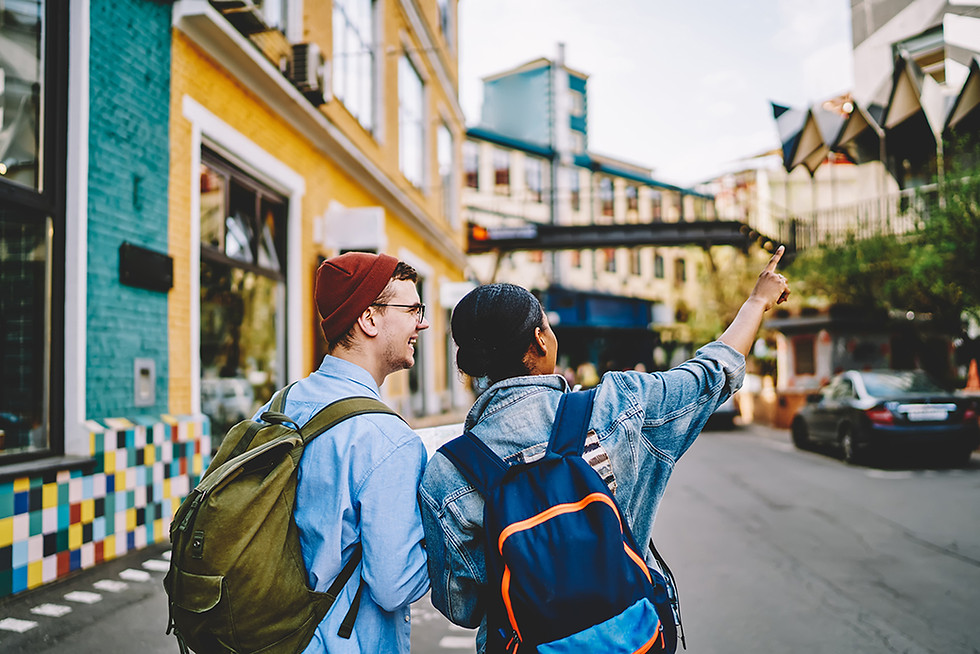Plus one …

The joy of serendipity … or when the Universe has other ideas
By Geoffrey Williams
When we travel solo, something shifts. We become more open, more curious, and more alive to the moment. And in that space, magic can happen – strangers become soulmates, moments become memories, and fleeting conversations can shape entire chapters of our lives.
Picture this. You are sitting alone at a small café, and the morning sun is just beginning to warm the table. You have no plans … only that the nearby busy and boisterous market might be worth exploring, or there’s a museum, or a network of quiet streets you want to explore. Your coffee and toasted sandwich arrive. The morning feels quietly complete. You exchange a grateful smile with a stranger at the table near yours … a nod, perhaps a ‘Hello’ … and less than an hour later, you’re engaged in conversation with someone who suddenly feels surprisingly welcome … and familiar. A week on, you’re still travelling together … and maybe, years later, you’re still deeply connected.
For solo travellers, stories like these are more than myth – they happen, often. And not because the road is necessarily full of soulmates, but because something subtle changes in us when we move through the world alone. We are less in our habits – our well-practiced, functional daily routines. And it is this quiet psychological transformation that creates the space for serendipity, our openness to possibility, to find us.
When we wander through our own neighbourhoods or familiar cities, something curious often happens — we stop really ‘seeing’ anything. The extraordinary details, the quiet charm, the small stories etched into familiar streets fade into the background like wallpaper. This ‘domestic blindness’ dulls our perception, a byproduct of routine and comfort. We grow so accustomed to the places we call home that we overlook their beauty and complexity, only truly noticing them again when we step away. In contrast, travel awakens us to the essence of difference – of architecture, light, people, and time itself. Our senses are sharpened, and every nuance, every moment, reminds us how much wonder waits to be found, even just beyond our comfortable and perhaps all too familiar doorstep.
Solo travel clears the fog of domestic blindness. Removed from familiar routines, habits, and companions, we become more alert and receptive to our surroundings. Without the usual distractions or expectations, every street, every conversation, every chance encounter becomes a fresh discovery. This heightened awareness doesn’t just apply abroad – it often reshapes how we reflect on our homes and hometowns when we return, rekindling curiosity and appreciation for the everyday places we once took for granted. In this way, solo travel expands not only our horizons but also the way we perceive the world and the people closest to us.
“Solo travel clears the fog of domestic blindness. Without the usual distractions or expectations, every street, every conversation, every chance encounter becomes a fresh discovery.”

Psychologists have long understood that unfamiliar environments sharpen our awareness. The brain, wired to seek patterns, lights up when those patterns are disrupted, especially when we step outside the routines of home and into somewhere entirely new. According to neuroscientist Michael Graziano, our minds are ‘prediction machines’, constantly adjusting to interpret new stimuli and social dynamics (Graziano, 2013). In this state, we tune in more closely … we make eye contact, we linger, and we strike up conversations not out of obligation, but instinct.
Solo travel magnifies this effect. Without the company of friends or partners, we’re unanchored, but not adrift. We’re ourselves, unfiltered, without the subtle pressures of performing a role, or being seen as serving a particular purpose in a friendship group … that ever reliable friend who is always on the other end of the phone. This alone makes us more receptive, and it is this openness that can draw people in. It’s one of travel’s great paradoxes – when we are most alone, we are often the most connected.
Vulnerability plays a part too. When we are navigating unfamiliar places, languages, or social cues, it’s impossible to remain guarded. There are missed buses, wrong turns, and awkward exchanges where no one speaks your language and you don't speak theirs. These moments wear down the walls we have built to protect our vulnerability and insecurity, and in their place, something more honest emerges. That kind of unguarded and spontaneous honesty makes deeper connection not only more possible, but more likely.
Social psychologist Arthur Aron, known for his influential “36 Questions” study, found that structured vulnerability and shared attention can significantly accelerate intimacy (Aron et al., 1997). When both people are far from home, a single breakfast or walk through a market can hold the emotional weight of weeks. The unfamiliar speeds things up, but it also deepens them.
Solo travellers often carry a quiet magnetism. They’re approachable, uncluttered, and easier to talk to than a group deep in conversation or a family mid-negotiation. Our minds are open to new experiences and information, and by ‘active listening’, we are more likely to say ‘Yes’, more likely to invite other people in, and more likely to linger with new companions after the walking tour ends.
“… and by ‘active listening’, we are more likely to say ‘Yes’, more likely to invite other people in, and more likely to linger with new companions after the walking tour ends.”
Of course, serendipity is never guaranteed. For every enduring friendship or unexpected romance, there are a dozen perfectly lovely conversations that fade into memory. But this doesn’t diminish their value. Connection isn’t always meant to last – sometimes, the significance lies in the moment itself. The person who helped you find your train … the stranger who shared their food and asked how you were, really. The man on the ferry who told you his whole story and then disappeared into the crowd.

As psychotherapist Esther Perel writes, “Love rests on two pillars – surrender and autonomy. Our ability to connect is strongest when we stand confidently in ourselves and remain open to others” (Perel, 2006). Solo travel, in its essence, is a practice of both. We have chosen ourselves, and in doing so, we have made space for someone else to walk in. That might be what makes these moments feel so magical. It's not that they’re rare, but that we’re finally in the right place – literally and emotionally – to notice them. In being alone, we’re not shutting the world out – we’re inviting it in, one unplanned conversation at a time.
You weren’t looking for anyone, but someone found you anyway … because maybe, just maybe, the Universe had other ideas.
References
Aron, A., Melinat, E., Aron, E., et al. (1997). The experimental generation of interpersonal closeness: a procedure and some preliminary findings. Personality and Social Psychology Bulletin, 23(4), 363–377.
Graziano, M. (2013). Consciousness and the Social Brain. Oxford University Press.
Perel, E. (2006). Mating in Captivity: Unlocking Erotic Intelligence. Harper Collins.
Geoffrey Williams is the The Solo Traveller Group’s Founder and Publishing Curator.
